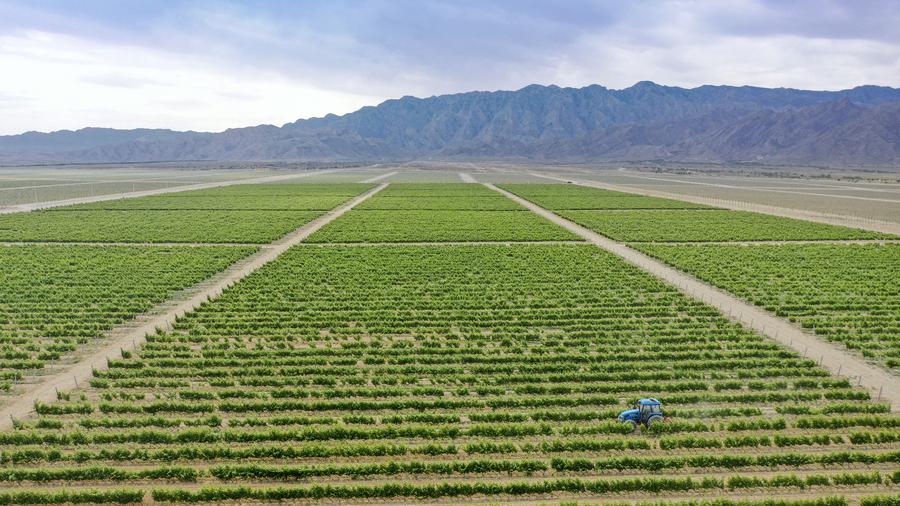Distinctive wines from China's premier region venture into global market

This aerial photo taken on June 5, 2023 shows a tractor weeding a wine grape planting base at the foot of the Helan Mountain in northwest China's Ningxia Hui Autonomous Region. (Xinhua/Feng Kaihua)
YINCHUAN, Aug. 9 (Xinhua) -- Much ingenuity has been dedicated to the design of labels on the sparkling wine from DEVO Winery, based in China's premier wine region. The splash of light green -- something like a brush-stroke -- turns dark as the temperature falls, indicating the best time to pop the cork.
The back label meanwhile, has two layers -- a Chinese label on top and an English one underneath. The Chinese label can easily be peeled off, making the bottle ready for export. DEVO Winery, based in northwest China's Ningxia Hui Autonomous Region, expanded its list of export destinations in July by adding Japan.
DEVO's export expansion is part of a larger trend of Ningxia wines gaining international recognition. According to Yinchuan Customs, in the first half of 2024, Ningxia exported 50,500 liters of wine, valued at over 5.75 million yuan (about 804,646 U.S. dollars), marking year-on-year increases of 24.79 percent and 70.16 percent, respectively.
As the Fourth China (Ningxia) International Wine Culture and Tourism Expo kicks off on Friday in Yinchuan, Ningxia's capital city, wines from the region -- with its ideal growing conditions of a dry environment and ample sunshine -- have once more been thrust into the spotlight. Local wineries like DEVO will be at the expo, aiming to boost exports.
A group of Japanese customers, seeking suppliers of sparkling wine, discovered DEVO. "After tasting our products, they were immediately impressed and placed an order," said DEVO Winery founder Zhai Liang. In July, nearly 90,000 yuan worth of sparkling wine was exported to Japan.
There are two wineries in China specializing in traditional method sparkling wines: one is the French-owned Chandon China Winery, and the other the DEVO, according to Zhai.
The traditional method produces finer bubbles in sparkling wine, giving DEVO a unique market position that helps it attract customers from Mexico, Singapore and Japan.
"Traditional method wines from China are still rare in international markets," Zhai added. "We're also in talks with customers from Thailand, the United Kingdom (UK) and the United States."
Decanter, a highly regarded wine magazine, highlighted DEVO's potential in its May edition, noting, "From the eastern foothills of Helan Mountain in China's Ningxia, new producer DEVO's first vintage release hints at the sun-drenched region's potential to make sophisticated sparkling wines."
Another winery benefitting from the Helan Mountain terroir is Kanaan Winery. While DEVO is just beginning to make its mark internationally, Kanaan has been exporting its still wines for years.
In December 2021, over 10,000 bottles from Kanaan were sold to Liberty Wines Ltd., a wine dealer in the UK, making the deal one of Ningxia's largest wine export orders that year.
"Liberty Wines has continued to reorder from us, which speaks volumes about their approval of our wines," said Wang Zhaoyue, assistant to the general manager of Kanaan.
Since June 2016, Kanaan wines have been exported to Germany, the UK, Switzerland, Austria, Singapore and Australia. The winery has exported over 9,000 bottles of wine so far this year, with an export value exceeding 690,000 yuan.
"Our wines match the taste preferences of foreign consumers, offering balanced flavors and high cost-effectiveness, making them ideal for everyday drinking," Wang said. "Our wines also exhibit good age-ability."
Hu Ningchuan, Kanaan's export manager, added, "With the convenience of scheduled customs inspections and other facilitation measures, the customs clearance for our wine exports is smoother, reducing logistics costs and giving us a valuable edge in the market."
"Our goal is to achieve 40 percent exports or even a split between domestic and international markets," said Zhai Liang when speaking about DEVO's long-range targets.
- Chinese display technologies draw crowds at CES 2025
- French winemaker pursues world-class wine in NW China
- Australian winemaker looks to go deep into Chinese market
- Xinhua Headlines: Belt & Road delivers Georgian specialty to Chinese dining tables
- GLOBALink | Georgian wine successfully taps into Chinese market


